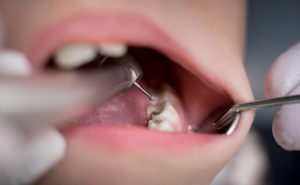How Does a Cavity Form?

Cavities Formation
Cavities are also called caries. Cavities are permanent damaged areas in the enamel of your teeth that develop into tiny openings. Left untreated, cavities can get larger and go beyond the enamel affecting deeper layers of the teeth. This can lead to severe toothache, infection, and tooth loss. Cavities are caused by tooth decay and occur over time. Tooth decay develops because of plaque, which is a clear, sticky film that coats your teeth. If plaque is not cleaned properly, it will deposit on your teeth and harden under or above your gum line into tartar. Tartar makes plaque much more difficult to remove creating a shield for bacteria. Plaque forms because the bacteria makes acid by feeding on the sugars and starches from the food we eat. The acid in plaque removes minerals in your tooth’s enamel. The erosion in the enamel causes tiny openings or holes, which is the first stage of cavities. Once the enamel is worn away, the bacteria and acid can reach the next layer, dentin. Dentin is a softer layer than the enamel and less resistant to acid.
Cavities Progression
As the cavities and tooth decay progresses, the bacteria and acid continues to reeve havoc on your teeth by moving deeper into the inner pulp layer that contains the nerve and blood vessels. The pulp layer can become swollen and irritated from the bacteria. Since there is no place for the swelling to expand inside the inner pulp layer, the nerve can become pressed causing pain and discomfort, even extending to the bone. Complications of cavities may involve pain interfering with daily living, weight loss of nutrition issues from difficulty eating or chewing, tooth loss may affect appearance, and in serve cases – life threatening infections can occur.
Cavities Prevention
Cavities can be avoided with good oral and dental hygiene. Here are some cavity prevention tips.
- Use a fluoride toothpaste to brush your teeth to help strengthen your enamel.
- Schedule regular visits with your dentist to get professional teeth cleanings and oral exams.
- Consider a dental sealant as a protective coating to seal off grooves on the tooth enamel and protect from plaque.
- Drink some tap water since most public water has added fluoride to help reduce tooth decay.
- Avoid snacking and sipping on sugary food and beverages to limit the development of plaque.
- Eat healthy food and drink plenty of water for better oral health, and overall healthy body.
If you think you have a cavity or would like a dental cleaning to prevent cavities, reach out to California Dental Group at (800) 407-0161 to schedule an appointment with our staff.




